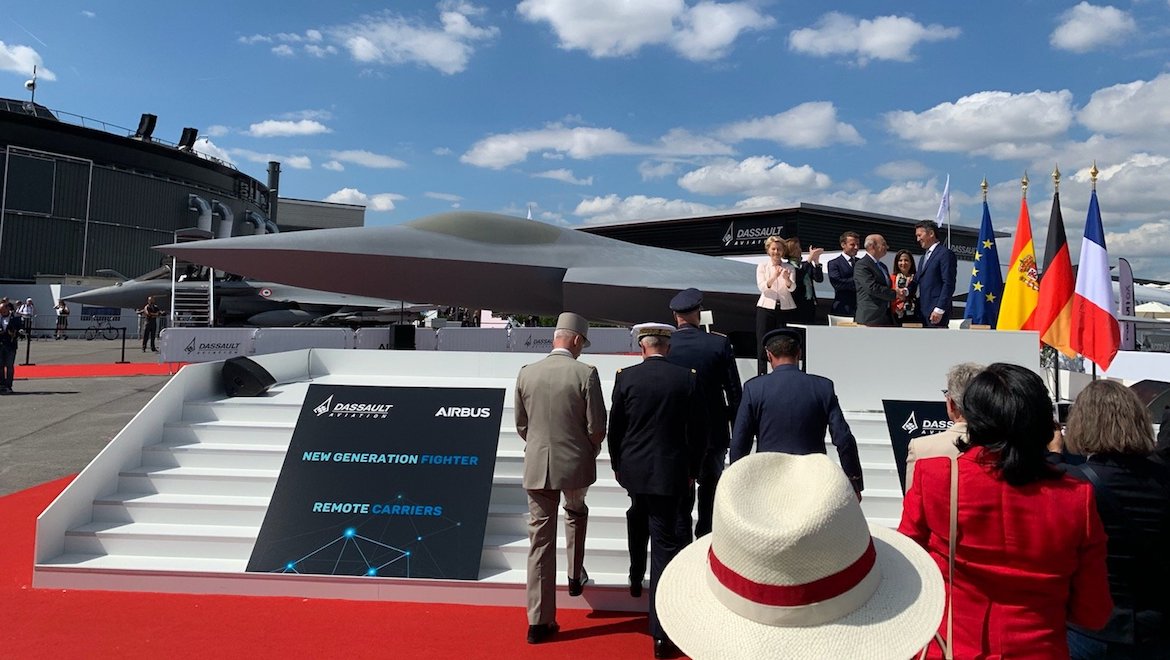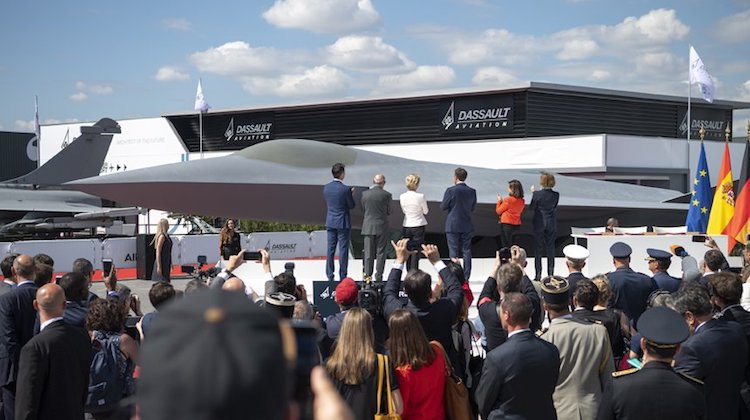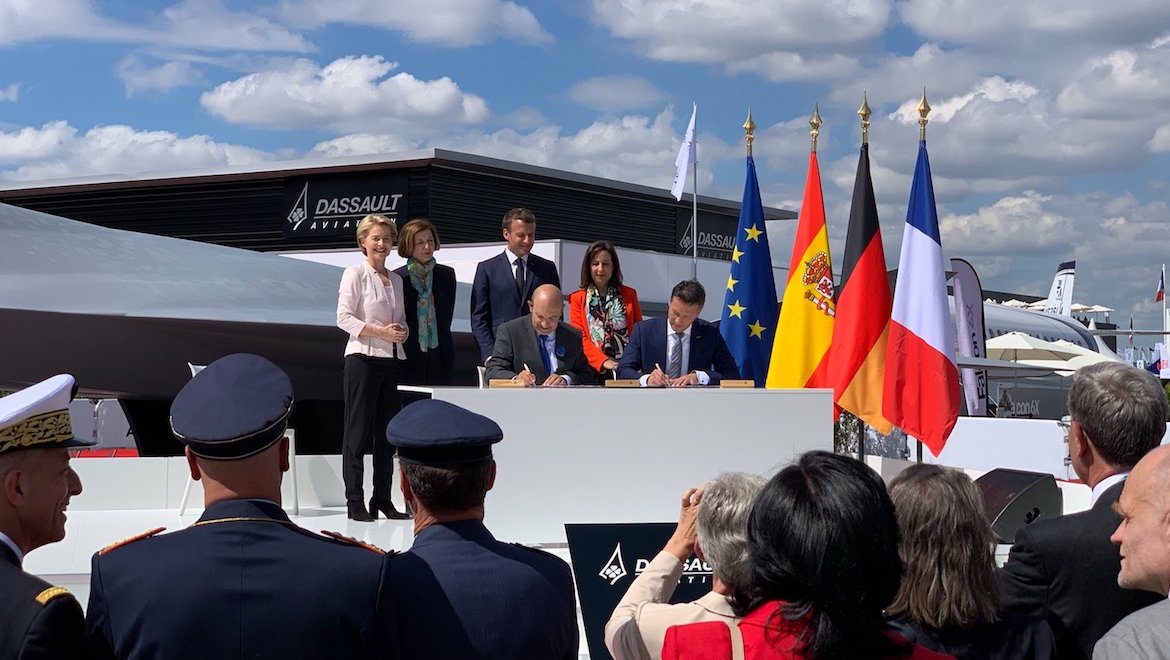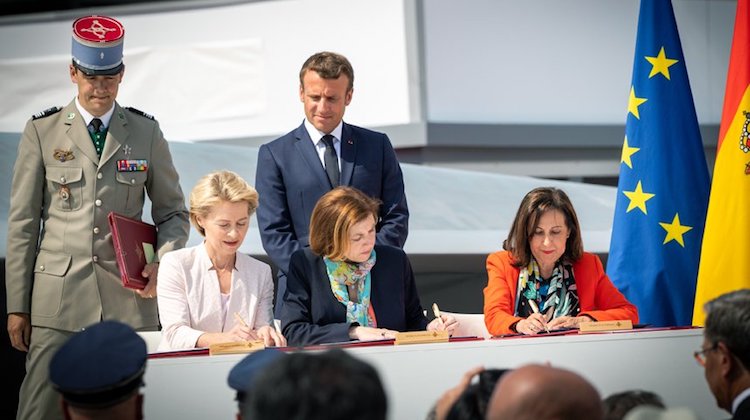
Some 50 years after the formation of Airbus, which French aircraft manufacturer Dassault did not participate in, the two companies are firmly in the same camp on the Future Combat Air System (FCAS), the European sixth-generation fighter, with a joint industrial proposal delivered to the governments of France and Germany for the FCAS’ first Demonstrator Phase on the first day of the Paris Air Show.
French president Emmanuel Macron and Minister of the Armed Forces Florence Parly, together with German Federal Minister of Defence Ursula von der Leyen and Spanish Minister of Defence Margarita Robles — from the three partner countries in FCAS — were on hand as Dassault Aviation chairman and chief executive Eric Trappier and Airbus Defence and Space chief executive Dirk Hoke revealed models of the two New Generation Fighter and Remote Carriers models. Spain joined the Franco-German partnership earlier this year.
“This demonstrator phase will cover the period between 2019 and mid-2021 and will serve as a starting point for demonstrators and technology development for a New Generation Fighter (NGF), Remote Carriers (RC) and an Air Combat Cloud (ACC) to fly by 2026,” the partners explained in a statement on Monday (European time).
“The various teaming agreements, which also include the companies MBDA Systems and Thales, contain a defined scope of planning of the first demonstrator phase, ways of working and commercial agreements. Additionally, a transparent and fair handling of intellectual property rights has been established in the respective teaming agreements.”
VIDEO: A full-scale model of the Future Combat Air System (#FCAS) jet is unveiled at the #ParisAirShow in front of the defence ministers of France, Germany and Spain and French President Emmanuel Macron. #ParisAirShow2019 pic.twitter.com/x3XRWGmfMV
— AFP News Agency (@AFP) June 17, 2019
As expected, France’s Safran and Germany’s MTU were confirmed to be developing a new powerplant for FCAS.
“The joint concept study awarded to Dassault Aviation and Airbus in January 2019 was the first step in a fruitful cooperation between both companies,” Trappier said.
“The first demonstrator phase marks another decisive step in the Next Generation Weapon System industrial organisation in which the New Generation Fighter, to be built by Dassault and Airbus, with Dassault Aviation as Prime contractor, as well as the Remote Carriers and Air Combat Cloud with Airbus as Prime contractor, will be the corner stone of the Future Combat Air System.
“The progress we have achieved on the FCAS programme in recent months is remarkable. It will shape Europe’s most decisive military air combat programme for the decades to come and turn out a strong move in constructing Europe’s sovereignty.”

Hoke said: “I am very satisfied with the level of trust and partnership we have built with Dassault already in the execution of the joint concept study, and now with the industrial proposal we’ve submitted to the both governments.”
“The principles of our industrial cooperation include joint decision making, a clear governance set-up, transparent ways of working, and a common preparation and negotiation of this first phase of the demonstrator activities.”
Dassault Aviation and Airbus expected a contract award for the first demonstrator phase by the fourth quarter of calendar 2019.


Meanwhile, European missile manufacturer MBDA unveiled its vision for the armaments on FCAS and other sixth-generation combat systems.
“MBDA’s vision for future air armaments is exhaustive and ambitious, and we are ready to take on the challenge to deliver to our domestic nations the full sovereignty of their future air combat systems by taking part in the definition and development of the armaments that these systems will operate,” said MBDA chief executive Éric Béranger said in a statement.
“MBDA has demonstrated that pulling together the best expertise in propulsion, guidance, connectivity and system integration have made Meteor the world best air-to-air missile, giving the pilots of European combat aircraft a decisive operational advantage. Thanks to its decades long culture of co-operation, MBDA will be equally able to develop the next weapons that will ensure European nations can sustain their air superiority in the long term.”
MBDA said there were five domain pillars for its capabilities:
• Deep Strike, “with cruise missiles using the most advanced options in order to penetrate and open breaches in the most efficient A2AD (Anti Access Area Denial) deployments in the future, for the benefit of friendly forces”.
• Tactical Strike, “with stand-off, networked and compact armaments, delivering precision effects but also able to saturate enemy defences thanks to pack or swarm behaviours”.
• Air-to-Air Combat “with Meteor [the air-to-air missile], which today has no equivalent and will keep its lead and remain a powerful asset for next-generation fighter aircraft”.
• Self-Protection, “with the ‘Hard Kill’ anti-missile system that will counter incoming missiles and so provide essential protection during ‘stand-in’ combat, when soft-kill counter-measures and decoys are no longer sufficient. Such a system is able to reverse the balance of power against saturating defences”.
• and a category of “enablers for the penetration of adversary defences thanks to the ‘Remote Carriers’ that deliver multiple effects, whether lethal or non-lethal, as well as new services for munitions such as intelligence, targeting, and deception of enemy sensors”.
Éric Béranger présente nos nouveaux concepts à la Ministre @florence_parly . Dissuasion, Coopération et armement des plateformes européennes, #MBDA au cœur de la #souveraineté. #PAS19 #StrongerEurope #FutureOfEurope #fildefense #AutonomieStratégique @Defense_gouv @DGA pic.twitter.com/d4FHlm2Efw
— MBDA (@MBDAGroup) June 17, 2019
A key question for the program, however, and one which remained unanswered, was that of the British BAE Systems Tempest, another sixth-generation concept.
While industry expectations and the Paris Air Show zeitgeist were that the two programs should naturally merge, the political sensitivities around Brexit, given the ongoing tumultuous political situation in the United Kingdom, may preclude this otherwise sensible cooperation.
#FCAS: @Dassault_OnAir & @AirbusDefence delivered industrial agreement on demonstrator programmes covering core elements of a Future Combat Air System: a New Generation Fighter, Remote Carriers and Air Combat Cloud. #PAS19
Read more: https://t.co/XFZ72d8BIE pic.twitter.com/JkLucbvUDx— Airbus Defence (@AirbusDefence) June 17, 2019




